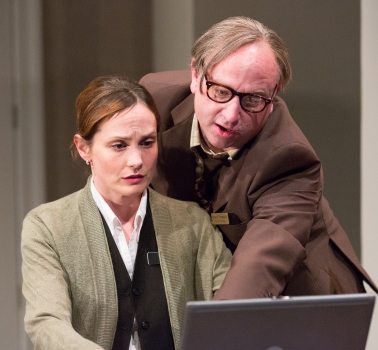
The Harassment of Iris Malloy, by Zak Berkman. Lisa Rothe directed its world premiere by Peoples Light & Theater Company, Malvern PA.
While most regional theaters are on summer vacation, Peoples Light has kept a full schedule. A musical about Johnny Cash is running in August and The Harassment of Iris Malloy had its world premiere from June 15 to July 17.
This is a smart topical choice: a play about a candidate for president of the United States, appearing just as the region geared up for the Democratic National Convention. Zac Berkman’s script brings up fascinating issues about differences in class.
The production had outstanding acting, and clever stage and lighting design. There is sufficient promise in the script to deserve an analysis of where it could be better. An intriguing set-up and interesting twists were marred by unconvincing dialogue and an ending that seemed tacked on after the drama achieved a resolution.
We saw, as another critic perspicaciously observed, two different plays vying for our attention.
A popular U.S. senator (Scott Bryce), considering a run for the presidency, has just given a fund-raising speech at an Atlantic City casino. He is attracted to Iris (Julianna Zinkel), a waitress who appeared to be fascinated by his speech. The senator has his aide bring the waitress to his hotel room. The aide leaves the two of them alone, and we’re sure we know what’s going to happen. (Remember Paula Jones’s alleged encounter with Bill Clinton?)
The aide, and the waitress’s sister (Teri Lamm), and a sleazy hotel detective (Pete Pryor), and the audience, all assume the same thing. Playwright Zak Berkman cleverly upsets our preconceptions, later in the play, by informing us that a military injury made sexual acts impossible for the senator and, consequently, the middle-of-the-night encounter was innocent.
The hotel snooper and his boss have a video recording of the outside door of the senator’s room (showing nothing incriminating except that they spent a long time together) and he sleazily tells Iris that she’ll make big money by coming forward to say that she and the senator had sex.
Because the woman is an impoverished unmarried mother of two small children, she goes along with the scheme. But several problems bother us. First, we’re given no convincing reason for the waitress’s staring at the senator during his speech, nor does her stare provide sufficient motivation for him to summon her to his bedroom. It seems contrived.
The script tries to explain this, as the senator says that she was the only person who made eye contact with him, and that was such a rarity that he felt the need to get to know her.
Second, medically, an inability to get an erection does not preclude all sexual acts. Thus the senator could very well have desired, and achieved, carnal satisfaction. The audience is asked to believe that this man was asexual, and that’s too much of a stretch.
Third, the alacrity with which Iris agrees to be the central figure in this scheme is cognitively dissonant. The playwright did insert a few lines to give her justification, yet it sounded artificial: The senator tells her that people will try to take advantage of her (certainly true, because of her gender and her social class) and therefore she should turn the tables and take advantage of them.
The waitress is presented as a decent woman, not at all a bimbo. Therefore it’s hard to buy her decision to go public with this scheme. Julianna Zinkel acted the part superbly, yet seemed miscast. In her body language and her appearance, Zinkel could pass for a woman in management or in sales, instead of the downtrodden loser that the script wants her to be.
Finally, the senator’s wife makes a decision that affects the end of the play, and the script doesn’t give an adequate motive for that action.
Still and all, Bryce is convincingly tortured as the senator, and the picture of this woman and her sister is touching. They are full of resentments, yet care for each other. Theirs is a gripping love/hate relationship.
Pete Pryor created distinct personalities in multiple roles: the senator’s aide, a reporter, and especially as the unsavory blackmailer.
Daniel Zimmerman’s set used translucent panels which separated Iris’s simple quarters from a lavish casino bedroom, aided by Tyler Micoleau’s effective lighting.
Please share your thoughts with us. Address to editor@theculturalcritic.com
Read other reviews on The Cultural Critic